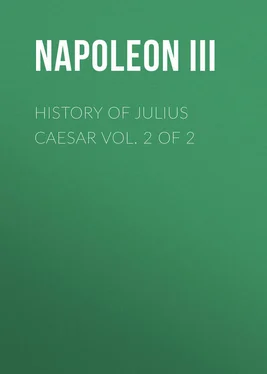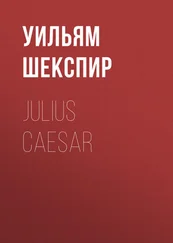Napoleon III - History of Julius Caesar Vol. 2 of 2
Здесь есть возможность читать онлайн «Napoleon III - History of Julius Caesar Vol. 2 of 2» — ознакомительный отрывок электронной книги совершенно бесплатно, а после прочтения отрывка купить полную версию. В некоторых случаях можно слушать аудио, скачать через торрент в формате fb2 и присутствует краткое содержание. Жанр: foreign_antique, foreign_prose, Биографии и Мемуары, на английском языке. Описание произведения, (предисловие) а так же отзывы посетителей доступны на портале библиотеки ЛибКат.
- Название:History of Julius Caesar Vol. 2 of 2
- Автор:
- Жанр:
- Год:неизвестен
- ISBN:нет данных
- Рейтинг книги:4 / 5. Голосов: 1
-
Избранное:Добавить в избранное
- Отзывы:
-
Ваша оценка:
- 80
- 1
- 2
- 3
- 4
- 5
History of Julius Caesar Vol. 2 of 2: краткое содержание, описание и аннотация
Предлагаем к чтению аннотацию, описание, краткое содержание или предисловие (зависит от того, что написал сам автор книги «History of Julius Caesar Vol. 2 of 2»). Если вы не нашли необходимую информацию о книге — напишите в комментариях, мы постараемся отыскать её.
History of Julius Caesar Vol. 2 of 2 — читать онлайн ознакомительный отрывок
Ниже представлен текст книги, разбитый по страницам. Система сохранения места последней прочитанной страницы, позволяет с удобством читать онлайн бесплатно книгу «History of Julius Caesar Vol. 2 of 2», без необходимости каждый раз заново искать на чём Вы остановились. Поставьте закладку, и сможете в любой момент перейти на страницу, на которой закончили чтение.
Интервал:
Закладка:
Divitiacus, in the name of the Ædui, interceded in their favour. After the retreat of the Belgæ and the disbanding of his troops, he had returned to the presence of Cæsar. The latter, who had, at the prayer of the Remi, just shown himself clement towards the Suessiones, displayed, at the solicitation of the Ædui, the same indulgence towards the Bellovaci. Thus obeying the same political idea of increasing among the Belgæ the influence of the peoples allied to Rome, he pardoned them; but, as their nation was the most powerful in Belgic Gaul, he required from them all their arms and 600 hostages. The Bellovaci declared that the promoters of the war, seeing the misfortune they had drawn upon their country, had fled into the isle of Britain.
It is curious to remark the relations which existed at this epoch between part of Gaul and England. We know, in fact, from the “Commentaries,” that a certain Divitiacus, an Æduan chieftain, the most powerful in all Gaul, had formerly extended his power into the isle of Britain, and we have just seen that the chiefs in the last struggle against the Romans had found a refuge in the British isles.
Cæsar next marched from Bratuspantium against the Ambiani, who surrendered without resistance. 256
March against the Nervii.
VI. The Roman army was now to encounter more formidable adversaries. The Nervii occupied a vast territory, one extremity of which touched upon that of the Ambiani. This wild and intrepid people bitterly reproached the other Belgæ for having submitted to foreigners and abjured the virtues of their fathers. They had resolved not to send deputies, nor to accept peace on any condition. Foreseeing the approaching invasion of the Roman army, the Nervii had drawn into alliance with them two neighbouring peoples, the Atrebates and the Veromandui, whom they had persuaded to risk with them the fortune of war: the Aduatuci, also, were already on the way to join the coalition. The women, and all those whose age rendered them unfit for fighting, had been placed in safety, in a spot defended by a marsh, and inaccessible to an army, no doubt at Mons. 257
After the submission of the Ambiani, Cæsar left Amiens to proceed to the country of the Nervii; and after three days’ march on their territory, he arrived probably at Bavay ( Bagacum ), which is considered to have been their principal town. There he learnt by prisoners that he was no more than ten miles (fifteen kilomètres) distant from the Sambre, and that the enemy awaited him posted on the opposite bank of the river. 258He thus found himself on the left bank, and the Nervii were assembled on the right bank. 259( See Plate 7. )
In accordance with the informations he had received, Cæsar sent out a reconnoitring party of scouts and centurions, charged with the selection of a spot favourable for the establishment of a camp. A certain number of the Belgæ, who had recently submitted, and other Gauls, followed him, and accompanied him in his march. Some of them, as was known subsequently by the prisoners, having observed during the preceding days the usual order of march of the army, deserted during the night to the Nervii, and informed them that behind each of the legions there was a long column of baggage; that the legion which arrived first at the camp being separated by a great space from the others, it would be easy to attack the soldiers, still charged with their bundles ( sarcinæ ); that this legion once routed and its baggage captured, the others would not dare to offer any resistance. This plan of attack was the more readily embraced by the Belgæ, as the nature of the locality favoured its execution. The Nervii, in fact, always weak in cavalry (their whole force was composed of infantry), were accustomed, in order to impede more easily the cavalry of their neighbours, to notch and bend horizontally young trees, the numerous branches of which, interlaced and mingled with brambles and brushwood, formed thick hedges, a veritable wall which nothing could pass through, impenetrable even to the eye. 260As this kind of obstacle was very embarrassing to the march of the Roman army, the Nervii resolved to hide themselves in the woods which then covered the heights of Haumont, to watch there the moment when it would debouch on the opposite heights of the Sambre, to wait till they perceived the file of baggage, and then immediately to rush upon the troops which preceded. 261( See Plate 10. )
Battle on the Sambre.
VII. The centurions sent to reconnoitre had selected for the establishment of the camp the heights of Neuf-Mesnil. These descend in a uniform slope to the very banks of the river. Those of Boussières, to which they join, end, on the contrary, at the Sambre, in sufficiently bold escarpments, the elevation of which varies from five to fifteen mètres, and which, inaccessible near Boussières, may be climbed a little lower, opposite the wood of Quesnoy. The Sambre, in all this extent, was no more than about three feet deep. On the right bank, the heights of Haumont, opposite those of Neuf-Mesnil, descend on all sides in gentle and regular slopes to the level of the river. In the lower part, they were bare for a breadth of about 200 Roman paces (300 mètres), reckoning from the Sambre; and then the woods began, which covered the upper parts. It was in these woods, impenetrable to the sight, that the Belgæ remained concealed. They were there drawn up in order of battle: on the right, the Atrebates; in the centre, the Veromandui; on the left, the Nervii; these latter facing the escarpments of the Sambre. On the open part, along the river, they had placed some posts of cavalry. ( See Plate 10. )
Cæsar, ignorant of the exact position where the Belgæ were encamped, directed his march towards the heights of Neuf-Mesnil. His cavalry preceded him, but the order of march was different from that which had been communicated to the Nervii by the deserters; as he approached the enemy, he had, according to his custom, united six legions, and placed the baggage in the tail of the column, under the guard of the two legions recently raised, who closed the march.
The cavalry, slingers, and archers passed the Sambre and engaged the cavalry of the enemy, who at one moment took refuge in the woods, and at another resumed the offensive, nor were ever pursued beyond the open ground. Meanwhile, the six legions debouched. Arrived on the place chosen for the camp, they began to retrench, and shared the labour among them. Some proceeded to dig the fosses, while others spread themselves over the country in search of timber and turf. They had hardly begun their work, when the Belgæ, perceiving the first portion of the baggage (which was the moment fixed for the attack), suddenly issue from the forest with all their forces, in the order of battle they had adopted, rush upon the cavalry and put it to rout, and run towards the Sambre with such incredible rapidity that they seem to be everywhere at once – at the edge of the wood, in the river, and in the midst of the Roman troops; then, with the same celerity, climbing the hill, they rush towards the camp, where the soldiers are at work at the retrenchments. The Roman army is taken off its guard.
Cæsar had to provide against everything at the same time. It was necessary to raise the purple standard as the signal for hastening to arms, 262to sound the trumpets to recall the soldiers employed in the works, to bring in those who were at a distance, form the lines, harangue the troops, give the word of order. 263In this critical situation, the experience of the soldiers, acquired in so many combats, and the presence of the lieutenants with each legion, helped to supply the place of the general, and to enable each to take, by his own impulse, the dispositions he thought best. The impetuosity of the enemy is such that the soldiers have time neither to put on the ensigns, 264nor to take the covering from their bucklers, nor even to put on their helmets. Each, abandoning his labours, runs to range himself in the utmost haste under the first standard which presents itself.
Читать дальшеИнтервал:
Закладка:
Похожие книги на «History of Julius Caesar Vol. 2 of 2»
Представляем Вашему вниманию похожие книги на «History of Julius Caesar Vol. 2 of 2» списком для выбора. Мы отобрали схожую по названию и смыслу литературу в надежде предоставить читателям больше вариантов отыскать новые, интересные, ещё непрочитанные произведения.
Обсуждение, отзывы о книге «History of Julius Caesar Vol. 2 of 2» и просто собственные мнения читателей. Оставьте ваши комментарии, напишите, что Вы думаете о произведении, его смысле или главных героях. Укажите что конкретно понравилось, а что нет, и почему Вы так считаете.












